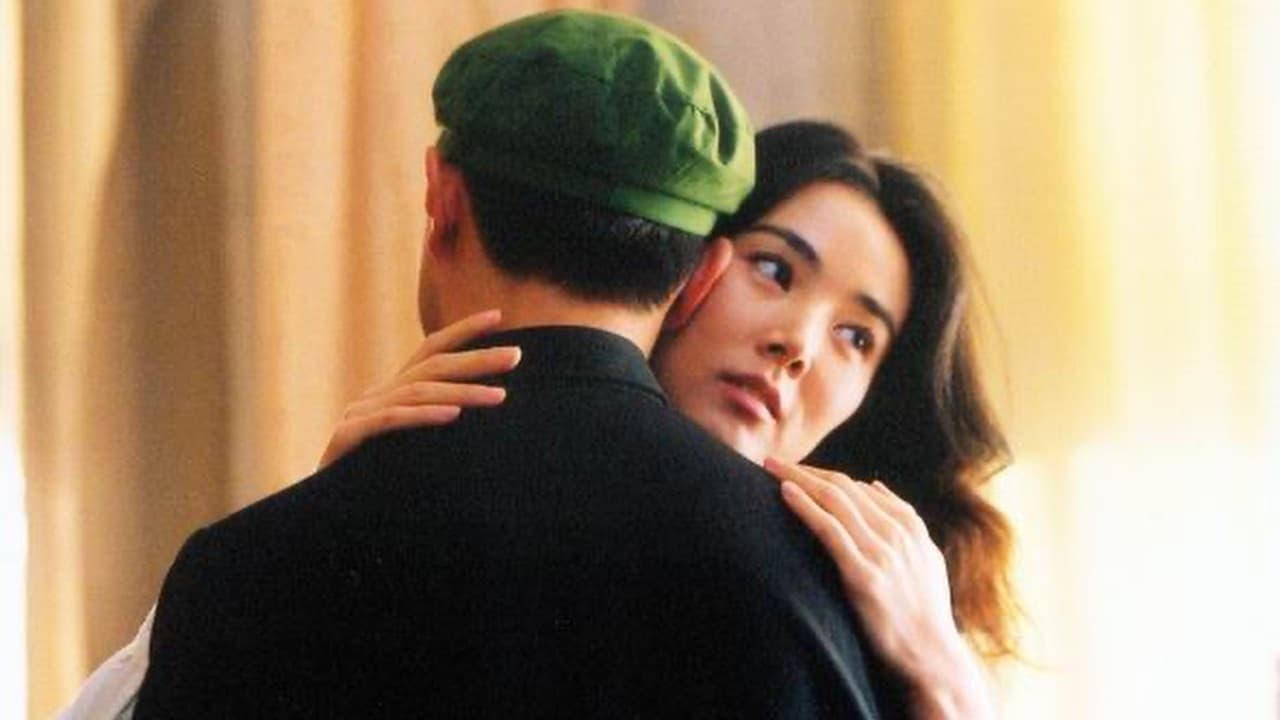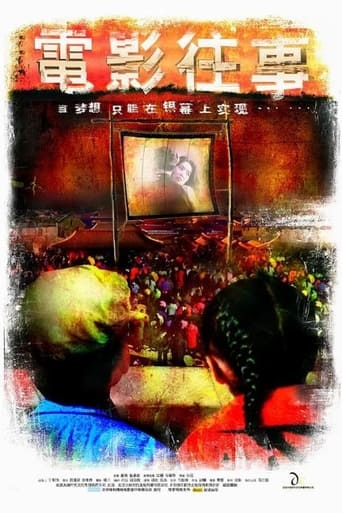

1st watched 4/2/2009 – 7 out of 10 (Dir-Xiao Jiang): Well delivered, emotional story about a girl, her ups & downs in her life, and how movie viewing and movies in general, were involved in the whole process. The main character is introduced at the beginning of the film after a paper boy runs into a stack of bricks in an alley and is assaulted by the girl for some reason. When he awakes from his injury, he wants to find out why she did this and looks for her. When he finds her, she doesn't tell him why she did this(she also can't hear, it appears) but asks him to take care of and feed her fish – knowing she's going away. He doesn't really want to do this, but as her enters her apartment where she lives he discovers a mini theatre-like room with a diary that he begins reading. The diary reveals the life of the girl and the movie then really begins as we discover what her life was like. The story of her and her family revolves around an outdoor theatre that the local townfolk come to in the evenings. Her mom announces the evening event through a loud speaker and becomes associated when the man who plays the films. Her mom wanted to be a movie star or singer but after bearing a child(the main character) out of wedlock is shunned by the locals and her dreams disappear. The rest of the movie follows the young girls friendships made and lost and the history of the outdoor theatre that eventually closes down due to the invention of television. The daughter is told early in life that her real father is a movie star(which is not true) but this also keeps her fascinated to the screen. The movie is wonderful at how it displays this story and the various characters although it is sad at various times, but if you are looking for an interesting and compelling and sensitive story about real life you will enjoy this one.
... View MoreELECTRIC SHADOWS is the delightfully charming debut from the Chinese director, Xiao Jiang. Her film asserts that there is a wondrous and remarkable connection between the mystery of dreaming and film appreciation. In Chinese, 'electric shadows' is the literal translation for the word 'cinema'. The characters in this film have an intense emotional attachment for motion pictures, and their lives have been shaped and guided by the movies they love. The rather strange storyline concerns a bicycle delivery driver who crashes his bike and is assaulted by a mysterious young woman. She is apprehended, and allows him to stay in her apartment to feed her fish. Within her apartment is a shrine to the Golden Age of Chinese motion pictures. During his stay, he discovers the girl's diary, and then the film becomes a flashback about how she came under the spell of the cinema. ELECTRIC SHADOWS is a marvelous mix of drama, comedy and tragedy with several young children in leading roles who effectively portray the innocence and delight of childhood. ELECTRIC SHADOWS is an alluring and enthralling melodrama which interprets the irresistible power of film.
... View More...does a pre-adolescent girl who'd lost her hearing manage to run away from a small village and in 10-15 years end up living in a big city high-rise apartment complete with a storage room, a well-equipped private screening room that seats at least ten and a balcony that just happens to overlook the hutong inhabited by her long-estranged parents...in contemporary China (population: 1.4 billion)? I know one is supposed to suspend disbelief at the movies, but this is beyond ridiculous! And how about the fact the the young man she injures in the present-day part of the story just happens to be an "adopted" childhood playmate from whom she was separated dozens of years before, hundreds of miles away? And the fact that she doesn't even recognize the guy whom she thinks has killed a beloved pooch and yet trusts and sends him to look after her fish, so that he can conveniently discover their childhood connection that lasted, what, maybe a week, which is more than enough time for an enraged father to locate his errant son in a small Chinese village? This is probably the worst-written Chinese film to make it to western arthouses and festivals in many a moon. It is an insult to the pre-Communist and Communist movies about which it waxes nostalgic. And shame on the critics who bestowed even an iota of praise on this wrongheaded and sentimental hogwash!
... View MoreMany who have seen this movie instinctively placed it in the category of movies that talk about watching movies (in this particularly case, Chinese movies in the earlier eras of movie-making in the country). Some go as far as saying that one's enjoyment of Electric Shadows will be significantly reduced if one's not familiar with the movies referred to. I don't think that is the case. Although watching movies does feature prominently in ES, even more important is the story of a mother and a child during some turbulent times.The original title in the Mainland is "Movie memories" while the local Chinese title given is a more literary "Images of dreams from childhood". The debut of its director, this movie is unsophisticated, sometimes contrived, but also fresh and affecting in some parts. If you have seen enough movies, you would have come across its the general structure a chance encounter of the protagonists that turn out to share some childhood memories. There is also a double narration set-up, first as a voice over from MAO Dabing ("big soldier" who was "Xiaobing", or "small soldier" when he was a kid). Then it carries on as voice over of Ling-ling, a childhood buddy that Dabing bumped into (almost literally) again, as adults.I am not going to spend time on the rather far-fetched coincidences, contrivances and unexplained plot holes. The real story, the flashback told basically through Ling-ling's diary (the voice over), starts with her mother Xeuhua's misadventure with a young lover (whose face we never saw) who deserted her with a child born out of wedlock during the Cultural revolution era in China.There is more depth in the movie than initially meets the eye. There were of course depictions of how the mother and child were ostracised, but the movie does not dwell on it. This is the time before China picked up in economic development and in the rural communities, the outdoor movie show was a big entertainment (but don't expect anything even remotely close to a drive-in). This becomes the element that integrates the entire movie, as most of the key events evolve around it. This is a happy time shared by mother and daughter. It is also where the mother meets Ling-ling's future step father, actually the owner of the modest outdoor movie "theatre". It's also where the friendship between Ling-ling and Xiaobing flourishes, as well as the scene of a tragedy later.This movie is surprisingly rich in contents. We first see how mother and child persevere, with dignity, through a hostile community. When things finally improve, to the extent of their general acceptance when the mother marries the kind man who has been treating them like family through Ling-ling's early childhood, thing take a turn. Although still a decent stepfather and a loving mother, the couple's attention understandably turns away from Ling-ling when they have their own little boy, a gentle soul. Ling-ling's resentment, however, is also understandable as the family's limited financial resources are dedicated to fulfilling her half-brother's dreams rather than her own.Although Mao Xaiobing is a key character and is one of Ling-ling's happiest memories from her childhood, he wanders into and out of her life almost nonchalantly. This is an interesting character in itself and reminds me of my summary line for "Nobody Knows" "getting into the child's mind". When we first see him showing up in this rural town with his family, a trouble-making urchin and prankster with a perpetual idiotic smile on his face, we don't know if we should despise or merely dislike him. When we find out that beating from his ill-tempered coal-minor father is a normal daily occurrence, we start to have some pity for him. When later he becomes almost like family to Ling-ling and her mother and we find out that he can be courageous and considerate despite the rough edges developed for survival, we positively like him. But in Mao Xiaobing's own mind, he is probably neither an aggressor or a victim, because playing nasty trick on others and being beaten by his father are simply the ways of his daily existence, and he has never known any other.33-year-old director Xiao Jiang*, a good looking and intelligent looking woman, had wanted to be a diplomat, but finally told herself that such a job would stifle her creativity and instead went to study directing in the film academy of Beijing. This movie, her debut, has won her awards in China and Morocco (Marrakech).* "Jiang" is her family name (probably no relative of previous president Jiang Zemin). "Xiao", meaning "small", is not part of her name but a very common prefix widely used to indicate informality and familiarity "Xiao Smith" would be something like "Smith, my boy".
... View More